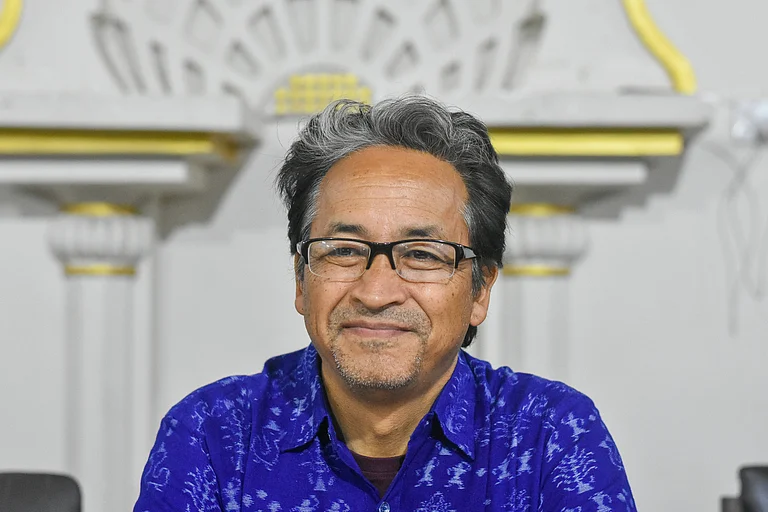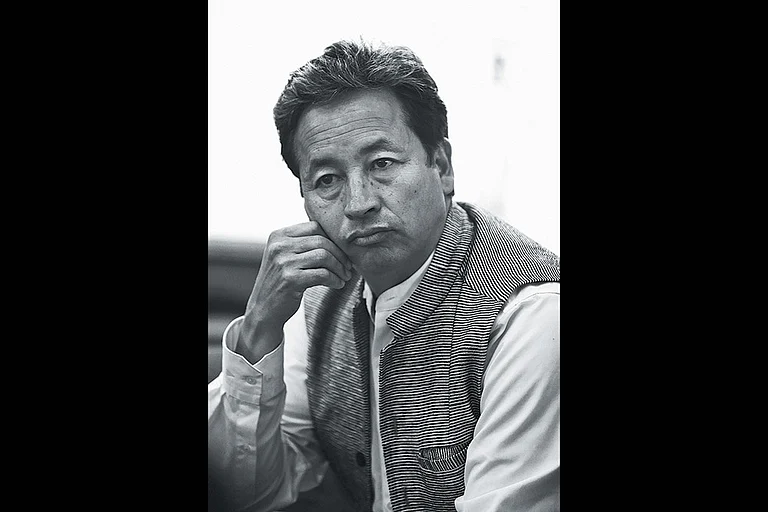On September 30, 2024, about 120 protesters from Ladakh, including well-known climate activist Sonam Wangchuk, were detained by Delhi Police while trying to reach the national capital. They were part of the 'Delhi Chalo Padyatra,' a march aimed at demanding sixth schedule status for Ladakh. This protest is not just about political rights; it reflects a deeper struggle for the identity, environment, and future of the people of Ladakh.
The protesters, mostly consisting of locals advocating for their rights, were stopped by police at the border of Delhi due to prohibitory orders against gatherings. The goal of the protest is to bring light to the urgent issues Ladakh is facing. These concerns are around climate change and the threats posed by uncontrolled tourism in the area. However, the heavy police presence and the detentions show the growing tensions between the government and the people of Ladakh, who feel their voices are being ignored.
Wangchuk expressed disappointment at the situation, sharing that the protesters initially believed they were being escorted for safety but soon realized they were being detained. This moment reflects a broader struggle for recognition and rights in Ladakh, where locals are fighting for their future.
What are the reasons for this Protest?
After becoming a Union Territory in 2019, Ladakh had gotten exposed to both, a multitude of opportunities and challenges. While the promises of development brought hope for better infrastructure, tourism, and economic growth, these advancements have come at a cost. The cost was overshadowed by the environmental degradation witnessed by the locals over the years. Traditional water sources have dried up, glaciers are melting, and the once-cold desert climate is warming rapidly. These changes threaten Ladakh's unique landscape and the livelihood of its people, fueling frustration among the locals.
What is the Demand for Sixth Schedule Status
One of the main demands of the protesters is to implement the sixth schedule of the Indian Constitution. This would grant greater autonomy to tribal areas, allowing them to have more control over their land and resources. For the people of Ladakh, this status is vital for preserving their unique culture and promoting development that respects local traditions.
The sixth schedule has been granted to certain regions in northeastern India to protect the rights of indigenous communities. Ladakhis believe that without this protection, their culture and environment are at risk from outside interests.
Concerns About Climate Change and Over-tourism
Ladakh is known for its captivating landscapes, hence successfully topping the list of the most popular tourist destinations. However, this influx of visitors is threatening for the fragile ecosystem. Concerning effects of climate change are being observed by the locals as there have been changes in the weather patterns, leading to a decline in snowfall and unpredictable rainfalls. This environmental shift drastically endangers traditional livelihoods, such as farming and tourism.
Wangchuk has long been an advocate for sustainable practices, emphasizing the need for tourism that respects the environment. The protests are a response to the uncontrolled tourism that has caused pollution and strained local resources.
Cultural Identity and Autonomy: A Fight for Survival
The protesters are not just fighting for environmental sustainability; they are also struggling to protect their cultural identity. Ladakh has a rich mix of traditions, languages, and customs that are at risk of being overshadowed by outside influences. The call for greater autonomy through the sixth schedule is also a way to safeguard these cultural aspects from being lost.
Additionally, implementing autonomous councils would give local communities a say in decisions affecting their lives. Many Ladakhis feel disconnected from the decision-making processes after the region became a Union Territory. Greater local governance would help them protect their land, culture, and resources.
The Need for Dialogue and Understanding
The recent detentions highlight a significant disconnect between the government’s actions and the needs of the people. It is crucial for the government to engage in genuine dialogue with the protesters to understand their concerns and aspirations. The stakes are high, not just for the people of Ladakh but for the environmental health of the region, which plays a vital role in the larger Himalayan ecosystem.
As Ladakh works to define its identity in the modern world, the government must prioritize sustainable development that aligns with the wishes of its people. This means recognizing the importance of Ladakh's heritage, addressing climate change, and creating policies that empower local communities.
The demands for sixth schedule status and more sustainable tourism practices are not just about politics; they reflect a desire for recognition and respect. The people of Ladakh are seeking a place for themselves in a changing world while holding onto the values and traditions that define who they are.
A Call to Action
The voices of the protesters, led by prominent figures like Sonam Wangchuk, are not just making noise; they are bringing attention to crucial issues that shape Ladakh's future and its people. The movement they are leading is a call for respect, representation, and recognition. It is essential for the government to listen, engage, and respond to the legitimate concerns these courageous people are raising before it's too late to preserve the essence of Ladakh.
Furthermore, the situation of Ladakh serves as an example that progress should not take place at the expense of identity and sustainability. As stewards of one of the most ecologically fragile environments on Earth, they need support to ensure that any development in the region aligns with the needs of their communities and respects the delicate balance of their surroundings.
The ongoing protests carry the message that the people of Ladakh will not play the part of mere spectators in their own story, or perhaps the condition in Ladakh is too critical for them to passively witness and wait in patience. They are actively standing up to protect their land, their rights, and their future. Their demands are reasonable as they are asking for what any community in a democratic society should be entitled to A say in how their region is governed, protection for their unique culture, and sustainable development that doesn't destroy their environment is not too much to ask for. The protesters are fighting for statehood and the preservation of their unique way of life, one that is deeply connected to the land they call home.























